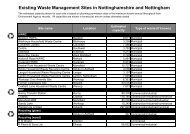Nottinghamshire Common Assessment Framework Handbook
Nottinghamshire Common Assessment Framework Handbook
Nottinghamshire Common Assessment Framework Handbook
Create successful ePaper yourself
Turn your PDF publications into a flip-book with our unique Google optimized e-Paper software.
D. Closing a CAF case<br />
1. A sign-off TAC/TAF meeting should always be held to agree the closure of a CAF and the reasons for this.<br />
2. For all children/young people leaving social care or the care of another statutory body where continuing multi-agency<br />
support has been agreed, the final statutory meeting becomes the TAC/TAF meeting that transfers back into CAF<br />
processes with the previous Lead Professional where possible.<br />
3. Once a CAF is closed a central copy of the CAF information should remain accessible for one year and thereafter<br />
flagged on the system and archived for a further six years.<br />
E. Regional standards for CAF Quality Assurance<br />
Review processes: All Children’s Trusts will ensure that the following themes are embedded within their quality assurance:<br />
a. Identifying training needs<br />
b. Monitoring CAF processes<br />
c. Identifying supervision issues<br />
d. Identifying support needs<br />
e. Performance management of services<br />
f. Effective cross authority working<br />
Supervision All practitioners supporting CAFs are entitled to specific feedback and on-the-job support. CAF review should<br />
become embedded with ongoing supervision arrangements.<br />
Self Review All practitioners will evaluate their effectiveness in each CAF against an agreed regional checklist (still to be<br />
developed in the regional toolkit, below)<br />
Accountability There must be clear lines of accountability within each Children’s Trust organisation to support the Lead<br />
Professional when a member of the TAC/TAF does not fulfil their agreed actions on the delivery plan.<br />
CAF Data Children’s Trusts will routinely analyse CAF data to identify case characteristics and emerging trends. An agreed<br />
minimum common data set will be shared on a regional basis.<br />
CAF Audit All Children’s Trusts will audit a proportion of closed CAFs (suggested one in ten) for the quality of process and<br />
impact on outcomes. The Children’s Trust will develop audit processes with partner organisations.<br />
Evaluation Children’s Trusts will analyse their CAF Data and CAF Audit information (both above) every three months<br />
to ensure implementation of all service improvements, commissioning implications and workforce development measures<br />
are addressed.<br />
Regional support for quality assurance<br />
• A regional QA group will review the implementation and effectiveness of these minimum standards and consider the<br />
regional implications of each Children’s Trust’s evaluations.<br />
• A regional toolkit will be developed to provide resources to support all of the above.<br />
F. Regional standard for initial training and induction<br />
Children’s Trusts will ensure that training is always available in at least the following areas for those requiring it:<br />
a. What it means to be part of a Team around the Child<br />
b. What is required to undertake a CAF assessment<br />
c. What it means to be a Lead Professional<br />
d. eCAF where and when applicable<br />
e. Information sharing protocols




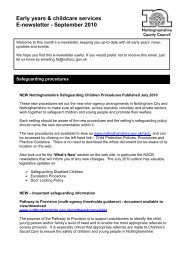
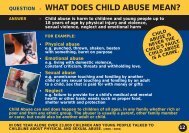

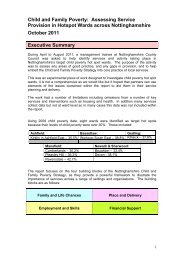

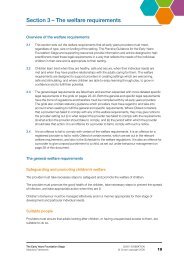
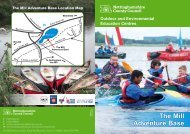
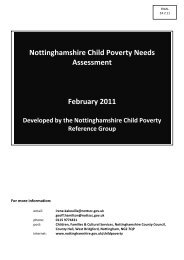
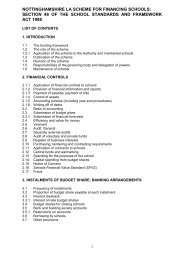
![Every Parent Matters [PDF 463KB] - Nottinghamshire County Council](https://img.yumpu.com/47250686/1/184x260/every-parent-matters-pdf-463kb-nottinghamshire-county-council.jpg?quality=85)

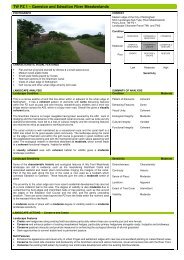
![School Employee Domestic Violence and Abuse Policy [PDF 228KB]](https://img.yumpu.com/46294446/1/184x260/school-employee-domestic-violence-and-abuse-policy-pdf-228kb.jpg?quality=85)
